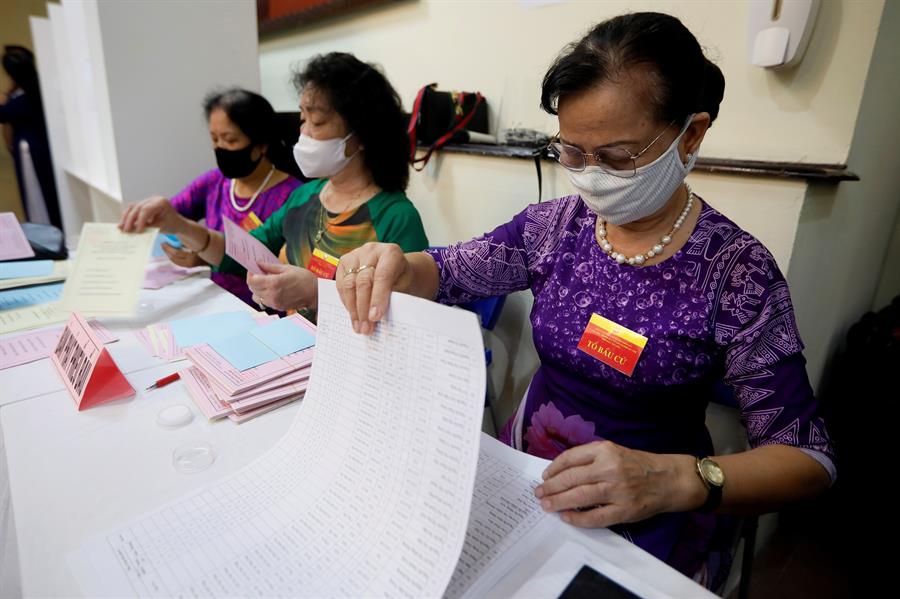Wednesday, November 17, 2021
The Philippines inches closer to internet voting
The Philippines’ Commission on Elections (Comelec) recently conducted test runs for internet voting as part of its mandate to enfranchise Filipino voters abroad.
In a statement, Comelec said that the test runs were part of a study on the use of internet-based technology for overseas voting. The poll body is expressly allowed by law to explore other modes or systems using automated election system.
The initiative saw thousands of overseas Filipino voters signing up to vote in simulated polls using three different platforms from competing voting companies. The tests yielded varying degrees of success in terms of participation with one provider hitting a record 64% voter turnout.
“This looks promising because traditionally we never go beyond 50 percent when it comes to voters who actually voted for overseas voting. Historically, it’s always been below 40 percent,” according to Sonia Bea Wee-Lozada, a Comelec official in charge of overseas voting.
“So, that’s how we are imagining it especially for overseas voting. Seafarers who may not be on land during the voting period, the internet voting system would be very much convenient and efficient for them,” she said.
Internet voting is expected to boost turnout as it enables voters to participate from anywhere there is a stable internet connection, a boon for overseas Filipinos who may not be able to take a day off to visit an embassy or consulate or find it expensive to travel to the nearest polling place.
The Comelec hopes that the test runs will be able to determine the operational and technical feasibility of conducting overseas voting using internet-based systems and gather data on technical specifications of the internet voting solutions currently being used in different countries.
The data gathered from these activities will inform COMELEC’s recommendatory report or policy proposal to Congress, which is expected to pass an enabling law for internet voting to be used in the midterm elections of 2025.
There are an estimated 2.8 million Filipinos working all over the world pumping back some $4 billion to their home country’s economy annually. Owing to this sector’s significant contribution to the country’s GDP, the Philippine government has accorded special status to overseas workers and has relentlessly been seeking ways to improve delivery of services to them, including making voting easier.
The success of online voting for overseas Filipinos could likewise prove to be the impetus for Comelec to consider rolling the system out to the rest of the country. Advocates are convinced that internet voting could make elections in this archipelagic country of more than 7,000 islands easier, safer, and cheaper.
Friday, August 27, 2021
Philippine poll body opens 2022 e-Voting source code for review, NGO lauds positive effect on transparency
The Commission on Election (Comelec), the body overseeing elections in the Philippines, has recently announced that it was opening to public scrutiny the source code of the e-Voting system for use in the 2022 elections. In an advisory, the Comelec has called on stakeholders to participate in the review.
The move has drawn the praise of advocacy group Democracy Watch which has applauded the initiative of the Commission on Elections’ (Comelec) as a step towards increased transparency.
In a statement, the group’s convenor Paco Pangalangan said that Democracy Watch recognizes the Comelec’s continued commitment to transparency and “lauds its latest initiative to engaging citizen groups in the Local Source Code Review of the Automated Elections System (AES).”
Democracy Watch sees the opening of the source code for review as increasing the credibility of the automated system among Filipino voters. It cites a survey it commissioned showing the automated elections have been well-received among Filipinos in the past.
Conducted by Pulse Asia after the 2019 midterm elections, the survey found that 87% of Filipinos said that they were satisfied with the automated polling system. The results also showed that 94% of respondents stated that they approved of the ease of use of VCMs and that 91% expressed that they would like to see automated voting continue in future elections.
“Building off of these findings, this Source Code Review is a crucial endeavor that can only increase transparency and reliability of AES as we approach the 2022 National and Local Elections. By reviewing the source code, participating citizens’ groups can help ensure that votes are accurately counted when Filipinos go to the polls next year,” the statement said.
The intensive software audit which will be conducted for seven months is pursuant to the nation’s Election Automation Law and has been held every election cycle since the country shifted to e-Voting in 2010.
Among the stakeholders invited to participate in the local source review are political parties, legitimate IT groups, and civil society groups known for their election reform advocacies.
Democracy Watch, a citizen-led democratic initiative that envisions a mature, reformed and a truly democratic political system for the Philippines, has urged concerned groups to take part in the review and submit soonest their applications to be participants.
“We call on these parties to exercise their right to participate in democracy and to fulfill their responsibility in holding government institutions accountable. Let us work hand in hand with the COMELEC for a free, fair, safe, and credible automated elections in 2022,” Pangalangan said.
The Philippines is slated to hold a general election next May where more than 18,000 positions are to be filled up including those of the president, vice president, senators, and congressional representatives.
Thursday, August 12, 2021
Amid intimidation, Brazilian Congress foils Bolsonaro’s plan to tinker with e-voting system
In a scathing rebuke to President Jair Bolsonaro, Brazil’s lower house of Congress rejected a Bolsonaro-backed bill seeking to add paper ballots to the country’s all-digital election system.
The defiant vote took place amid saber-rattling by the Brazilian military, which paraded tanks in the streets of the capital city of Brasilia, reminiscent of the country’s military dictatorship from 1964-1985.
Senator Simone Tebet decried the show of force, saying that “tanks in the street, precisely on the day of the vote on the paper ballot amendment, is real, clear and unconstitutional intimidation.”
The proposed amendment died after failing to muster the 308 votes needed to pass, getting only 229 yes votes and 218 no votes.
Earlier, Bolsonaro launched a blistering attack on the voting system, calling it susceptible to fraud, without citing evidence. He warned that elections will not be held next year “if they are not clean and democratic.”
Brazil’s electronic voting system has been in use by the country in all elections, plebiscites, and referendums since 2006, including the 2016 polls which swept Bolsonaro into power.
The populist president is demanding for the adoption of a hybrid system using printed ballots that can be counted in case of disputes. Critics, however, fear that this regression to a manual system would undermine the credibility of the existing all-electronic system.
Critics are wary of Bolsonaro’s motives, suspecting that the sweeping and unsubstantiated claims are laying the grounds for claims of fraud in case the incumbent loses. The 66-year-old president’s popularity is at a record low and is in danger of losing to left leaning Luiz Inacio Lula da Silva, who is topping the surveys.
Observers are finding similarities between Bolsonaro’s move to that of former US President Donald Trump, who months before the elections in November 2020 had claimed in speeches, tweets, and interviews that he would be cheated, in case he lost.
The Brazilian Congress’ vote comes on the heels of a strongly-worded statement issued by a group of current and former judges warning of chaos if Brazil goes back to its manual counting of 150 million printed ballots.
Bolsonaro has been drawing flak for his anemic pandemic response which has resulted in Brazil registering the second-highest number of deaths in the world.
Monday, June 28, 2021
Philippine poll watchdog greenlights security of e-voting system ahead of elections
An influential election watchdog group in the Philippines has assured voters of the security of the country’s automated elections system, ahead of the May 2022 elections.
“We have come a long way in terms of technological advancements in the way we vote. Our automated system is a big improvement over the old manual system,” said noted IT-professional Henry Aguda, a trustee of the Parish Pastoral Council for Responsible Voting (PPCRV), in an online voter education seminar.
PPCRV is a church-based citizen’s group which has been keeping watch over Philippine elections for three decades. It has over 500,000 volunteers all over the country.
PPCRV is a church-based citizen’s group which has been keeping watch over Philippine elections for three decades. It has over 500,000 volunteers all over the country. The Philippines started automating their elections in 2010 and since them the PPCRV has validated all election results.
Responding to questions during the webinar, Aguda said that the vote counting machine (VCM) lessens the possibility of electoral fraud. “We have experts who have seen how the source code is secure and how encryptions have been done,” he said.
Aguda further cited that VCMs run software that has been “meticulously developed for the purpose of counting votes.” He also cited the machine’s capability to detect duplicate or fake ballots, flag ballots intended for other machines, as well as other components of security such as the physical i-button keys held by poll workers.
“Our machines are very secure,” Aguda said, adding that “I cannot imagine somebody successfully rigging an election through the machines.”
Dr. William Yu, who is also an IT-professional and a trustee of the poll watchdog group reminded voters that the automated election system is a system. “It is important to recognize that this is a system. The VCM is secure but there are other things — the process, the i-buttons keys that are also part of the overall security,” he said.
“If you want to break the system you have to break all of those. And it’s not just the machine, you will also have to compromise all the people on the site, the volunteers,” he said.
Yu also dismissed the idea of a rouge vote counting machine being used to cheat.
“In case there is a shadow VCM or ghost VCM that is in the system, we should be able to track it down with our parallel count process. Not only are there controls within the system itself, but there are also controls that we as poll watchers are able to do,” Yu said.
As a way to further increase transparency of the system, Yu is advocating to increase the number of precincts that are audited in every Philippine election. The post-election audit performed is known as the random manual audit (RMA). “It always helps to have more checks and balances,” he said.
As a way to further increase transparency of the system, Yu is advocating to increase the number of precincts to be subjected to the random manual audit (RMA). “It always helps to have more checks and balances,” he said.
The RMA shows an increasing match between the electronic count and the manual count since 2010 when the Philippines started automating its elections. In 2010 it was 99.580%, 2013 -99.9474%, 2016 - 99.9027%, and 2019 - 99.9953%.
Thursday, June 10, 2021
Null votes, slow count and fraud allegations underscore need for electoral reforms in Peru
Left-wing candidate Pedro Castillo appears to be headed to victory in one of Peru’s most divisive elections ever. Yet his rival Keiko Fujimori is disputing the count, calling for the nullification of some 300,000 ballots for alleged anomalies, enough to potentially erase the slim 70,000 vote margin of Castillo.
While Fujimori’s allegations have yet to gain widespread support, with international election observers seemingly inclined to give the elections a clean bill of health, the same observers have cautioned against prematurely dismissing the claims.
After saying that they have "observed a positive electoral process" and that the “The Mission has not detected serious irregularities,” observers from the Organization of American States were quick to urge authorities to wait until challenges to the vote have been resolved before calling a winner.
At the very least, many believe that this should prompt Peruvian authorities to initiate reforms to stave off potential crises in similarly tightly contested elections.
The list of complaints, which seem to correspond with known weaknesses of the manual system, include lack of signatures on tallies, arithmetic mistakes, and doubts on whether a vote was properly marked in a ballot.
In a press conference, Fujimori and her lawyers claimed to have discovered proof of forged signatures on more than 500 ballot tallies, plus other anomalies, imputing such on the Free Peru party, to which Castillo belongs.
Experts have long warned against human intervention of any sort in elections, whether the hand counting of ballots or reliance on physical signatures to verify tallies. In recent years, manual elections have increasingly been regarded as being prone to errors, if not outright fraud. In fact, the idea of reducing human intervention has been a powerful impetus behind the shift by countries from manual to automated elections.
Moreover, the number of null votes in this Peruvian election cycle is cause for concern. While a lot of voters might have intentionally left their ballots blank in protest, the potential for disenfranchisement is alarming.
In the last three Peruvian elections (the first round of this year’s presidential and both rounds of the 2016 presidential elections), null votes surpassed 5% of total number of ballots cast. This translates to more than 1 million voters which were potentially disenfranchised because they “marked incorrectly their ballot”. In a contest separated by just 70,000 votes, this could easily spark a crisis.
Even more tellingly, the slow pace of the vote count has created the very conditions for this heightened political tension. While countries which use automation technology regularly expect to know their next leaders just a few hours after the polls close, a week has already passed without the Peru vote having been completely counted.
Peru finds itself at a crossroads -- stay with the flawed manual elections and risk a potentially disastrous outcome down the road, or start exploring ways to modernize its elections and take its fledgling democracy to a new level of stability.
Monday, May 31, 2021
Defying Covid-19, London holds successful elections
When Covid caught the world by surprise last year, London was one of regions in England which bore the brunt of the pandemic’s fury leaving a staggering 4,000 residents dead by April.
Election authorities had no choice but to postpone their May elections one year, a draconian move they hoped would buy them more time to figure out a way to uphold the right to suffrage while a pandemic raged. With a whole year to plan, the city made sure to refine its processes and implement enhanced safety protocols. Aside from the mandatory mask and social distancing measures, authorities decided to extend the normally 1-day count to two days.
Mary Harpley, Greater London Returning Officer (GLRO), said shortly before the May 6 polls that the new counting process would be different due to the Coronavirus pandemic. “Much planning has gone into ensuring that the safety of Londoners and election staff is prioritized. We look forward to running a safe, fair and efficient democratic process in partnership with the London boroughs, to allow London's 6.2 million voters to have their say on 6 May.”
With such a large voting population scattered across 33 boroughs, London has one of the most challenging local election landscapes in the UK. They employ three different counting systems: first-past-the-post, a supplementary vote system, and a form of proportional representation. To facilitate vote counting GLA authorities employ election technology.
London’s e-counting solution ensured ballot papers were scanned and processed quickly and accurately, with full auditability of results, which resulted in increased transparency and integrity. The electronic count of 10.6 million votes was validated by the Constituency Returning Officer and the Greater London Returning Officer.
The centralized processing of the voter-marked ballots, hitherto a one-day process, began on May 7th, and was carried over to the next day to ensure a Covid-19 safe environment. High-speed scanners deployed in the three count centers made sure that count was delivered with speed, efficiency, auditability, and all the while requiring less staff.
Deputy Greater London Returning Officer, Alex Conway commended everyone involved in the exercise, saying that “the commitment of their teams meant the rapid shift to delivering a COVID-safe election was a real success.”
Wednesday, May 26, 2021
Undeterred by new Covid surge, Vietnam goes ahead with parliamentary polls
In yet another demonstration of the resiliency of the electoral process, Vietnamese voters turned out at the polls recently to elect representatives to the 500-seat National Assembly, amid a new surge of Covid-19 cases. The country has earned praises last year for having one of the better pandemic responses in the region but has been battling an outbreak since late April.
Strict health protocols were implemented to prevent transmission, with voters being required to mask up and subjected to temperature checks before even queuing. Hand sanitizers were also freely available at polling centers, which were equipped with loudspeakers broadcasting reminders to keep a safe distance.
Observers were quick to point out how this election saw only 74 independents out of the total of 866 candidates vying for the parliamentary posts. In fact, the Communist Party in Vietnam, one of the last such governing communist parties in the world, still controls much of the power structure in the country and is largely intolerant of criticism.
Nonetheless, the regular and uninterrupted holding of elections is seen as crucial in maintaining the country’s trajectory towards freer trade, a more open society and eventual full democratization.
The nearly 69.2 million registered voters also voted for members of the people’s councils at provincial and district levels.
“I hope all voters, knowing their role as the owners of the country, will join the vote to select the most trusted and worthy candidates to represent their voices,” National Assembly chairman Vuong Dinh Hue said before the election.
Hue noted that the Sunday’s elections was the first “amid the most dangerous coronavirus outbreak that’s spread to nearly half of the number of provinces, with many of them under lockdown.”
Election results are expected to be announced in two weeks.
Wednesday, April 28, 2021
Technology powers Albanian elections for the first time; observers hail initiative as a success
When Albanian voters went to the polls on April 25, most of them were identified and authenticated using a new electronic voter identification system, an innovation that many observers are lauding as a success.
Reinhold Lopatka, head of the OSCE Parliamentary Assembly delegation cited the introduction of electronic technologies as an “important and welcome improvement for Albania.”
The international election observation mission 65 observers from the OSCE PA, issued a statement with preliminary conclusions on April 26. “I had the pleasure of witnessing the high degree of efficiency of the biometric identification system used throughout the country. This is an important step, which can only increase confidence in the electoral process," commented Lopatka.
The initiative of the Central Elections Committee (CEC) to implement technology was born out of a need to curb voter fraud. Historically, Albania had been racked by allegations of voting manipulation. Authorities had tried to modernize elections before, but after failing to implement a voter verification solution and an electronic counting solution in 2013, it put the introduction of election technology on hold.
"Last year's political agreement prompted important reforms and led to the introduction of electronic technology, which served to increase confidence in the electoral process," said Ursula Gacek, Head of the OSCE / ODIHR Election Observation Mission in Tirana.
Observers also wished that the CEC was able to roll out the technology to all precincts, an undertaking that was hampered by lack of material time in which the agency was only given three months to implement the landmark initiative.
"I wish technology would be used more in the next elections, " said Azay Guliyev, Special coordinator and short-term leader of the OSCE / ODIHR mission.
Lealba Pelinku, a deputy commissioner, is optimistic of future elections, saying that “when the CEC succeeded in three months, I am convinced that in the next elections electronic voting will be a 100% success!”
Aside from the biometric voter identification system, the CEC also piloted e-Voting solutions in selected precincts, indicating that Albania could be headed toward full automation of its elections.
"We observed some of these centers and I can say that it was an extraordinary success," said Valdete Daka, Chairwoman of the Central Election Commission in Kosovo.
Mrs. Kristina Kostelac, Election Administration Analyst / CEC Observer, on the other hand, said that their group “welcomes the adoption of relevant bylaws by the CEC that enabled the use of new technologies, including the Electronic Voter Identification System (EVIS) and pilot projects of the CEC.”








